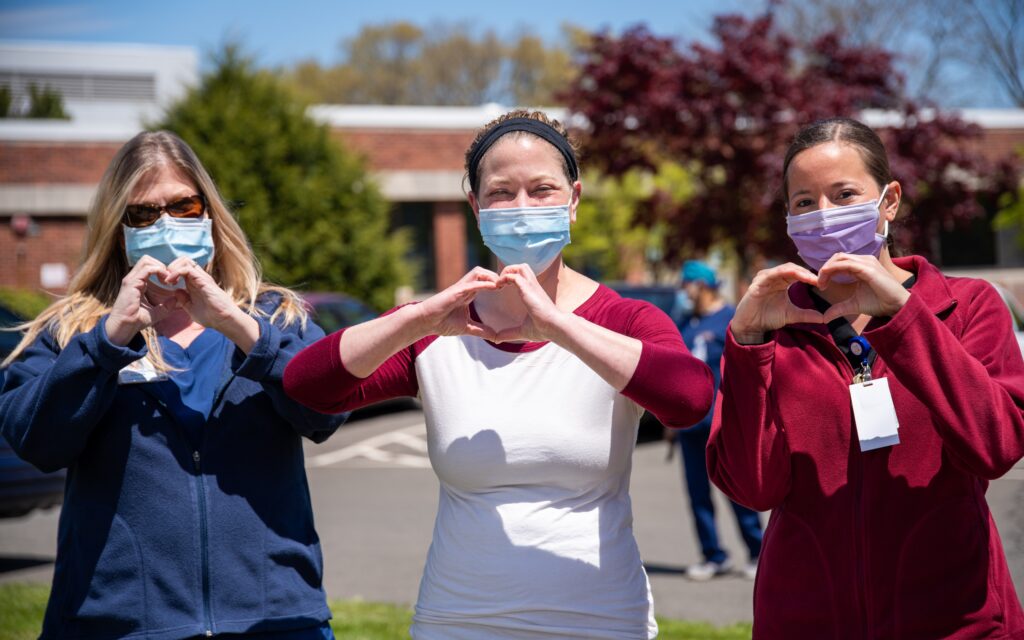Psychiatric nurses are registered nurses who offer support to patients with mental illnesses. Most people are impacted by poor mental health at some point in their lives, either personally or by witnessing a loved one struggle. In these periods, access to mental health care is incredibly important. Often, a patient won’t see a single provider but works with a team of mental health professionals to start their recovery journey. Psychiatric nurses are an integral part of this team. In this exploration, we unpack the roles and responsibilities that psychiatric nurses play in mental health care and take a specific look at how they support eating disorder treatment.
What Is a Psychiatric-Mental Health Nurse?
Psychiatric-mental health (PMH) nurses are compassionate and dedicated registered nurses (RNs) who undergo specialized training to provide essential care for individuals grappling with behavioral and psychological challenges. A 2022 report from Mental Health America highlighted that about 1 in 5 people in the United States live with mental illness. With so many of our friends and loved ones suffering from invisible illnesses, the role of PMH nurses becomes clear and poignant. These mental health professionals contribute to the well-being of their patients by fostering a supportive and empathetic environment for their mental health and psychiatric care. PMH nurses play an important role in helping their patients along their recovery journeys.
As a distinct subset of RNs, the responsibilities of psychiatric nurses vary based on their specific training and the unique needs of their patients. They have a diverse skill set that spans nursing, psychological, and neurobiological expertise, allowing them to address a spectrum of mental health issues. Their scope of practice encompasses care administration, case management, and treatment coordination while also providing emotional support.
What sets psychiatric nurses apart is their ability to navigate their nursing and mental health care roles with unparalleled compassion and sensitivity. Possessing excellent communication and relationship-building skills, these professionals nurture caring connections with their patients. These strong relationships help create a foundation of trust essential for effective mental health support. In the upcoming sections, we will take a closer look into the certifications and responsibilities of psychiatric nurses and provide insight into the specific role they play in eating disorder treatment.
Education and Certifications
American Psychiatric Nurse Association (APNA)
Before practicing in the mental health field, psychiatric nurses undergo comprehensive training and education. Their careers follow a path similar to traditional nurses at first, by going to school to earn a nursing degree. There are three paths to get an RN degree:
- 2-year associate’s degree nursing program
- 3-year diploma program for nursing
- 4-year university or college bachelor’s degree program in nursing
To earn the specialized credential of a psychiatric nurse, individuals must accumulate 2 years of full-time RN practice. Within three years of passing the RN licensure exam, they are required to amass 2000 hours of clinical experience specifically in psychiatric nursing, accompanied by 30 hours of continued education in psychiatric mental health nursing.
Beyond the foundational nursing education, psychiatric nurses undergo additional training in pharmacology and behavioral sciences. Working in mental health care facilities requires a different knowledge base from traditional medicine. In addition to this specified training, psychiatric nurses have a passion for helping patients with mental health struggles. Of course, soft skills like this aren’t necessarily a prerequisite for a nursing certification, but psychiatric nursing can be a stressful field.
Some nurses may have also taken additional steps to expand the scope of their responsibilities. You may also encounter Advanced Practice Registered Nurses (APRNs) and psychiatric mental health nurse practitioners in the mental health field. These roles take a master’s degree or doctorate in nursing and a certification from the American Nurses Credentialing Center. The additional training as an APRN allows nurses to take more responsibility with patients and offer a broader scope of treatment.
What do Psychiatric Nurses Do?
In any sector of healthcare, nurses fill many roles in their workplace, and psychiatric nurses are no different. From setting goals with individuals to coordinating care plans, they move mountains to make sure patients get the care they need. Psychiatric nurses work in various settings such as hospitals, correctional facilities, assisted living facilities, and treatment centers. With big brains and bigger hearts, it may seem like they can do anything, but psychiatric nurses do have a specific subset of responsibilities. Here, we’ve highlighted some of the basic responsibilities that a psychiatric nurse will take care of. At the core of all of these roles, PMH nurses establish strong connections with patients through therapeutic relationships, creating a supportive environment to address their mental health needs.
Basic Responsibilities:
- Conduct intake screening and ongoing evaluations
- Engage in case management to ensure comprehensive care
- Instruct and inform patients about self-care practices
- Provide crisis intervention and stabilization
- Monitor and manage treatment regimes
- Coordinate care and collaborate with multidisciplinary teams
- Educate and interface with families and caregivers
- Facilitate psychiatric rehabilitation and intervention for patients
- Assist individuals in working towards their recovery goals
Additional Responsibilities of Advanced Practice Registered Nurses (NPs or CNSs):
Some psychiatric nurses advance their expertise, by obtaining licensure as nurse practitioners (NPs) or clinical nurse specialists (CNSs). With advanced degrees, these professionals take on additional responsibilities, including:
- Ordering, performing, and interpreting lab tests and diagnostic studies
- Making referrals for health programs
- Administering integrative therapy interventions
- Diagnose and recommend treatment
- Offering clinical supervision for other healthcare professionals
- Providing psychotherapy for individuals or groups
Who Do Psychiatric Nurses Work With?
Psychiatric nurses work with anyone dealing with mental health challenges and mental illness. People from all walks of life have probably interacted with a psychiatric nurse. To provide context for the breadth of these positions, here are some examples of patients with whom psychiatric nurses work.
- Children Exposed to Trauma: Nurses offer support and therapeutic interventions to help young individuals navigate the challenges associated with trauma.
- Soldiers with PTSD: Working with military personnel to address and manage post-traumatic stress disorder, nurses are trained to recognize the unique needs of those who have served.
- Older Adults with Alzheimer’s Disease and Dementia: PMH nurses provide specialized care and support for elderly individuals facing cognitive challenges.
- Adolescents, Teens, and Adults Living with Mental Illness: They work to support individuals at different life stages who are coping with mental health challenges, fostering resilience and recovery.
- Recovery from Substance Abuse and Addiction: Nurses integrate mental health care into comprehensive treatment plans when working with clients on the path to recovery from substance use disorders,
- Treatment and Recovery of People with Eating Disorders: Psychiatric nurses are a part of the multidisciplinary team focused on the treatment and recovery of individuals facing eating disorders.
By working with such a broad spectrum of clients, psychiatric nurses contribute significantly to the holistic well-being of diverse communities, emphasizing personalized and compassionate care tailored to each individual’s unique needs.
Types of Psychiatric Care for Eating Disorders
Before delving into the integral role of psychiatric nurses in eating disorder care, it is essential to comprehend the multifaceted approaches employed in the treatment of these complex mental illnesses. Eating disorders are conditions that affect a person’s relationship to food, eating, or exercise. The DSM-5 recognizes five types of eating disorders including anorexia nervosa, bulimia nervosa, binge-eating disorder, avoidant/restrictive food intake disorder (ARFID), and other specified feeding or eating disorders (OSFED).
Each of these requires personalized and comprehensive support for healing. Eating disorder treatment typically involves a collaborative effort with various professionals, including mental health specialists, dieticians, medical and dental professionals, and the invaluable support of loved ones and caregivers. This multidisciplinary approach recognizes the dual challenges of the physical complications of the illness and the psychological barriers. However, as eating disorders are a type of mental illness, psychiatric care is a key piece to get patients on the road to recovery. Both medication and different therapeutic modalities can be a part of someone’s care plan.
Medications in Eating Disorder Recovery
Psychiatric care in eating disorder treatment often incorporates medications, especially for patients grappling with co-occurring mental health conditions like anxiety, depression, obsessive-compulsive disorder, or PTSD.
Antidepressants, particularly selective serotonin reuptake inhibitors (SSRIs), are some of the most commonly prescribed medications in eating disorder treatment.
Therapeutic Modalities
In both inpatient and outpatient care settings, psychotherapy is a consistent tool to support eating disorder recovery. Some common modalities used include:
- Cognitive Behavioral Therapy (CBT): This approach helps individuals recognize negative thought patterns associated with their eating disorders and equips them with healthier coping strategies.
- Interpersonal Psychotherapy: Focused on interpersonal issues, this therapeutic modality aids in symptomatic recovery by addressing the relational dynamics influencing the eating disorder.
- Psychodynamic Psychotherapy: This approach delves into self-awareness by unraveling subconscious patterns that influence behavior, fostering a deeper understanding crucial for sustained recovery.
- Family Therapy: Recognizing the impact of familial dynamics, family therapy creates therapeutic settings involving family members, fostering a supportive environment for the individual’s journey toward recovery.
Psychiatric Nurses and Eating Disorder Support
Psychiatric nurses are the support system for eating disorder treatment. They are from the clinicians administering them, and the patients themselves are the psychiatric nurses. In many different settings, PMH nurses support a patient’s recovery by offering person-centered care. Psychiatric nurses form relationships with patients grounded in trust, compassion, and accountability. This connection helps them more effectively manage and support patients’ physical and mental well-being throughout the recovery process. In addition to their many responsibilities across mental health services, psychiatric nurses support eating disorder treatment in a few specific ways:
- Administer Medication: Nurses can help guide patients on when to take medications and answer any questions they may have about specific treatments. For inpatient treatment, nurses will also administer medication at the respective times.
- Coordinate Care: By building rapport with patients, psychiatric nurses become powerful advocates for their care. Nurses are in constant communication with the entire treatment team. They keep all care providers up to date on patient progress and can help connect patients transition to lower levels of care.
- Emotional Support Through Specialized Expertise: Socioemotional support is paramount in eating disorder recovery, and psychiatric nurses can offer active listening, empathy, and positive reinforcement. Though they won’t lead counseling sessions (unless they have advanced certifications), they still provide consistent emotional support. Because of their relationships with patients, nurses have an ear to the ground and can empathetic care.
In supporting eating disorder recovery, psychiatric nurses offer empathy, expertise, and advocacy to support individuals on their path to healing.
Build Your Treatment Team with Support From The Alliance
Psychiatric nurses stand as indispensable pillars of support for people with all types of mental illnesses including eating disorders. With specialized training and a broad scope of responsibilities, PMH nurses are the backbone of treatment teams. Through person-centered care, emotional support, and advocacy, these trained professionals contribute to the holistic well-being of individuals on the path to recovery. Their unique position ensures a nuanced understanding of the challenges posed by eating disorders.
At The Alliance, we pride ourselves on connecting people with the best-fit treatment for their specific situation. By providing resources, fostering understanding, and offering a supportive community, The Alliance plays a pivotal role in creating a network of compassion and knowledge that empowers individuals in their journey toward recovery. We connect people struggling with eating disorders with care teams that are dedicated to finding a path to healing that works for each individual. And often in more ways than one, psychiatric nurses are key players in mapping out that path. For more information, give our helpline a call!


